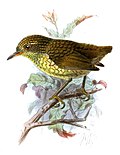| Grallaricula | |
|---|---|
 | |
| Ochre-breasted antpitta (Grallaricula flavirostris) | |
| Scientific classification | |
| Kingdom: | Animalia |
| Phylum: | Chordata |
| Class: | Aves |
| Order: | Passeriformes |
| Family: | Grallariidae |
| Genus: | Grallaricula P.L. Sclater, 1858 |
| Type species | |
| Grallaria flavirostris [1] Sclater, 1858 | |
| Species | |
10, see text | |
Grallaricula is a genus of bird in the antpitta family Grallariidae.






